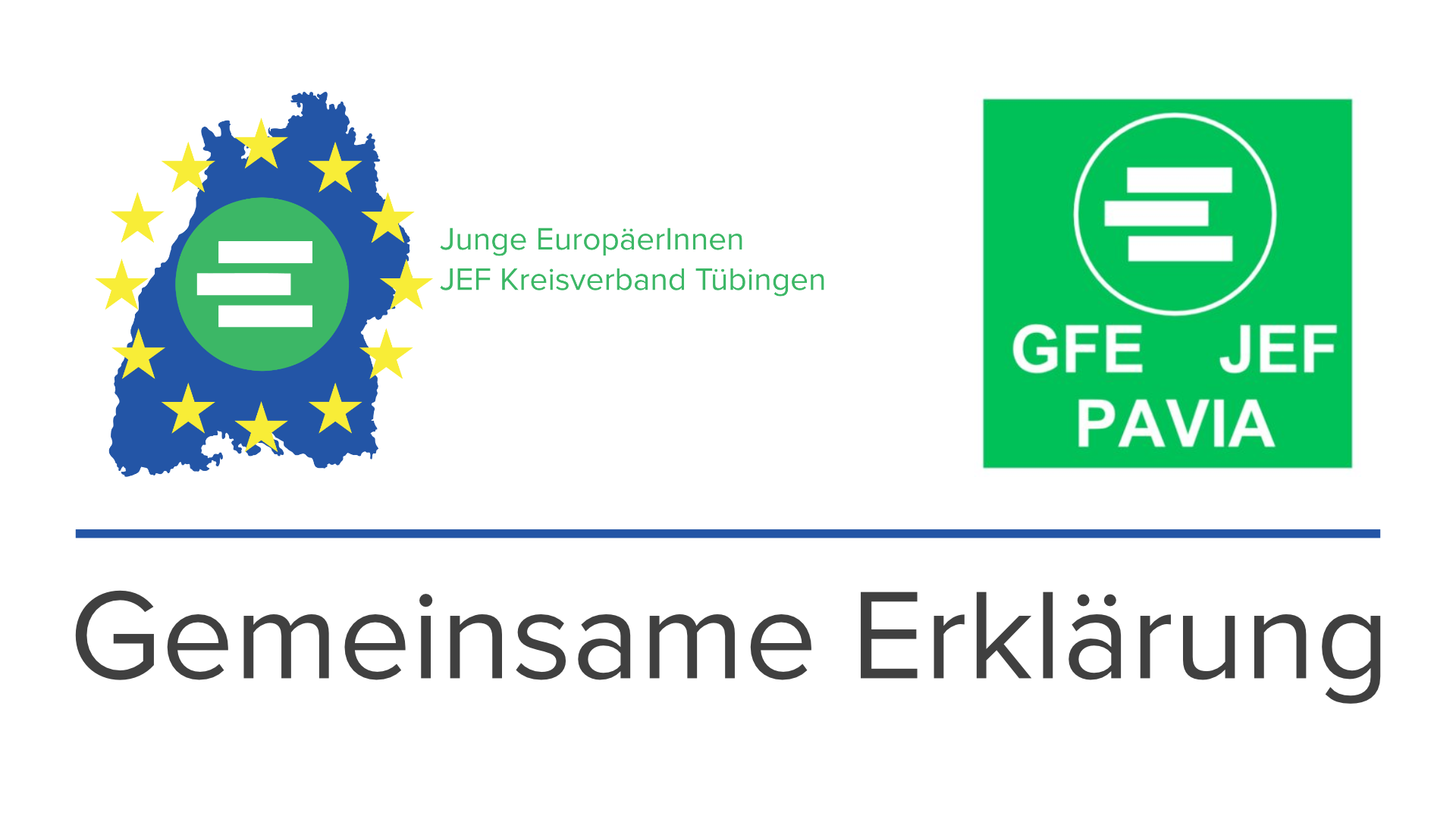
How is the economic crisis affecting different parts of Europe, and how can this crisis be addressed adequately in a European approach? In the light of the European Council, which is meeting these days in order to discuss about a European approach to address the severe consequences of the Covid-19 pandemic, JEF Tübingen and GFE Pavia have issued a joint statement.
JEF Tübingen and GFE Pavia met up on Tuesday, 19.05.2020, for the online discussion table „Europe in Crisis?“. Attended by members and friends of the Italian as well as the German section, we analyzed the European response to the health and economic crisis and discussed our standing as Young European Federalists in this debate.
Two major things were noted: Covid-19 is a terrible hit on our personal lives and well-being, as well as on our economies. United by a common currency and by an economic union, the economic crisis cannot be tackled domestically. Therefore, we stress on the demand of a common European response based on solidarity. Secondly, consequences of the Covid-19-crisis are facilitating new approaches of online activism which can also serve as an inspiration for the future. JEFers across the network are gaining from increased networking across borders and the exchange of experiences and strategies. As a result, new perspectives and strategies are being taken.
As JEFers, we can gain from the latter to reach the former: Unite across Europe in the demand for a swift and solidary European response to the economic crisis. Hence, GFE Pavia and JEF Tübingen strengthen their voices by issuing a joint statement and are looking forward to future cooperation.
—
Joint Statement
We, as Young European Federalists, look with concern at the risks and damages of the European economy caused by the Covid-19 pandemic. We stress that Europe is facing a multi-level crisis. The first level consists of the health emergency. The second level consists of the economic and social crisis, produced by lockdown measures that have paralysed businesses and jobs. The third level, more generally, can be recognised by looking critically at the situation, understanding it as a manifestation of the tragic nature of history. In fact, the Covid-19 pandemic represents the challenges of globalisation and demands political communities to address them.
We note that, initially, the crisis management has consisted of a patchwork of examples of European solidarity and national solo efforts. In terms of national solo efforts, we regret to see national export bans and border closures as the first responses to the health crisis. Further, we strongly condemn abusing the crisis for emergency laws that endanger democracy and the rule of law, as witnessed in Hungary, and call upon the EU institutions to react. We appreciate the examples of European solidarity among member states, as well as coordinating efforts by the EU. Therefore, we support equipment sharing and treatment of Corona-patients across borders but warn that these signs of solidarity must go beyond mere symbolic actions. In politics, there is no such thing as solidarity in voluntary terms. Nevertheless, there are institutions and institutionalised forms of solidarity. For solidarity to become the guiding principle of the European political model, this principle will have to be politically realised through the development of strong supranational institutions.
In terms of financing, we fear that money dedicated to crisis response or recovery is either reallocated within the existing budget or raised outside the EU framework and given in the form of loans. We fear this might further deepen the divide between Southern and Northern member states and eventually threaten the survival of the EU. Representing youth from both Italy and Germany, the instability of the current approach and its negative impact on the domestic economies of the borrowing states, as well as on European public opinion on the EU is evident to us and of utmost concern. We welcome the Commission’s proposed recovery plan featuring grants and loans financed via European borrowing and managed by the Commission, which is a necessary step towards a stronger and more federal Europe. We therefore urge national governments to support this plan.
In this sense, we demand the European Parliament to not approve inadequate agreements from the Council and to prevent European decisions to be dominated by a few powerful member states. The agreement necessarily has to include a reform of the Union’s own resources, which is also a key point in the European Commission’s proposal to guarantee the issue of European debt. In order to manage the Covid-19 pandemic crisis and other great challenges triggered by globalisation (climate change, digital economy, migration), member states have to equip the EU with new instruments and extended competences to address the named issues effectively. In the perspective of the relaunch of the European integration project, the EU needs a federal budget, characterised by two innovative aspects concerning its dimension and nature. In fact, it will be financed by the Union’s own resources, fed and supported by a fiscal capacity of the Union.
The new fiscal capacity should be legitimised through democratic procedures. In this sense, we believe that the role of the Conference on the Future of Europe should consist of supporting this roadmap, setting the conditions for the constitutional process. Only in this way will the EU have the resources and legitimacy to plan major reconstruction investment plans in the medium term, and, in the long term, to meet the other major challenges of our century, protecting the welfare and freedom of future generations.